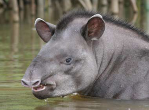Around a thousand Peruvian soldiers and police officers destroyed seven and seized thirteen boats used by illegal gold miners in the Peruvian Amazon, reports the AFP. The move is seen as a first strike against the environmentally destructive mining. Used to pump silt up from the river-bed, the boats are essential tools of the illegal gold mining trade which is booming in parts of the Amazon.
Along the Inambari River in southeastern Peru, illegal gold miners clear floodplain forests and blast riverbanks looking for gravel deposits that may hold the precious metal. When found the gold is amalgamated with toxic mercury, which often ends up in the river, contaminating fish. According to Peru’s Environment Minister fish in the area have mercury levels that are three times higher than the amount approved by the World Health Organization.
Furthermore, from the government’s perspective, it cannot tax the illegal mining operations, even when miners strike it rich.
The illegal gold trade also produces numerous social problems, according to the BBC, including drug trafficking, indentured labor, and child prostitution.
The operation, the first of its kind in Peru, aims to destroy 300 large pieces of mining equipment on the Inambari River.
Related articles
Guyana bans gold mining in the ‘Land of the Giants’

(03/01/2010) Guyana has banned gold dredging in the Rewa Head region of the South American country after pressure from Amerindian communities in the area. A recent expedition to Rewa Head turned up unspoiled wilderness and mind-boggling biodiversity. The researchers, in just six weeks, stumbled on the world’s largest snake (anaconda), spider (the aptly named goliath bird-eating spider), armadillo (the giant armadillo), anteater (the giant anteater), and otter (the giant otter), leading them to dub the area ‘the Land of the Giants’. “During our brief survey we had encounters with wildlife that tropical biologists can spend years in the field waiting for. On a single day we had two tapirs paddle alongside our boat, we were swooped on by a crested eagle and then later charged by a group of giant otters.”
High gold prices, army collaboration, play role in mining invasion in southern Venezuela
(11/25/2009) Illegal gold mining involving wildcat miners, the Venezuelan army, and indigenous groups is threatening one of the country’s most biodiverse river basins, according to local sources.
High mineral prices drive rainforest destruction
(08/13/2008) The surging price of minerals is contributing to degradation and destruction of rainforests worldwide, warns a researcher writing in the current issue of New Scientist.







